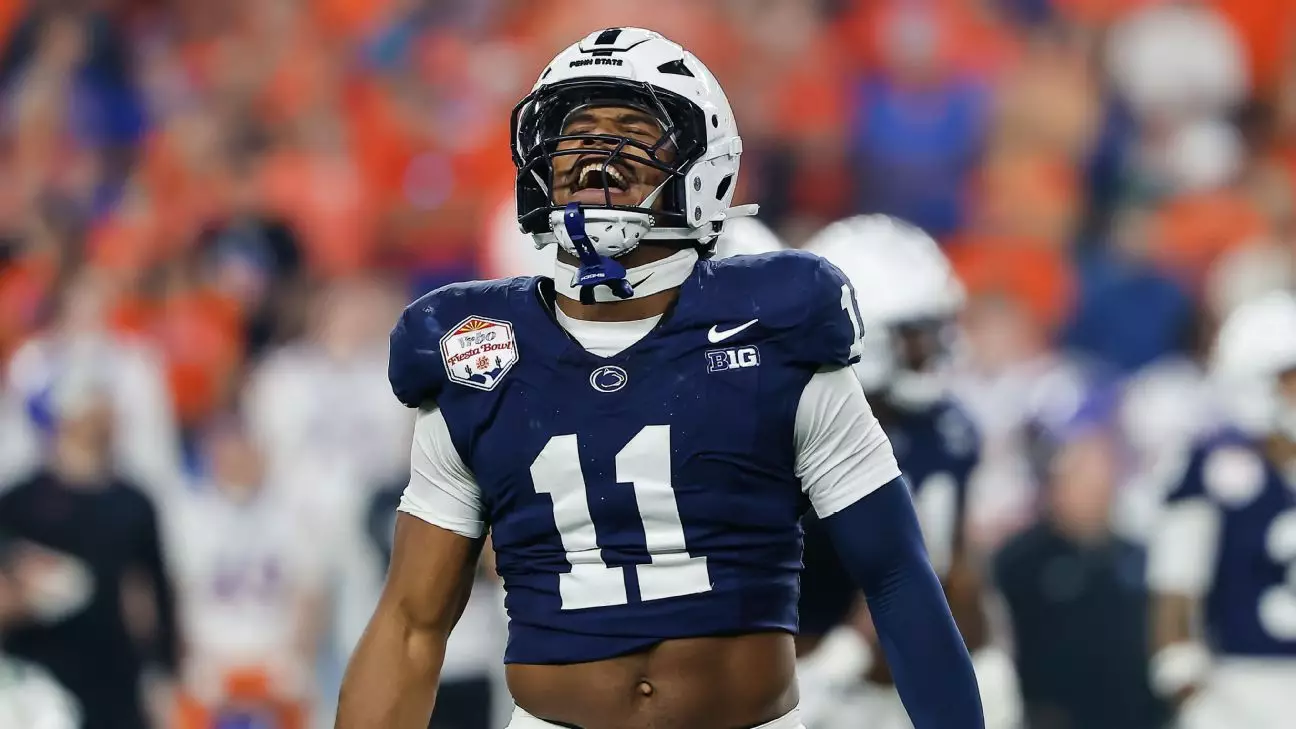As the NFL draft approaches, a palpable sense of anticipation fills the air—especially for players vying for the coveted first overall pick. Among these hopefuls, Penn State’s outside linebacker Abdul Carter is making a passionate case for his selection. Carter’s advocacy is not merely about stats; it revolves around his intrinsic value and potential to turn a defensive unit into a formidable force. Despite facing injury setbacks, his self-belief shines through, presenting a compelling narrative that may just resonate with NFL decision-makers.
A Unique Approach to Impact
At a recent pro day, Carter outlined what differentiates him from other prospects: versatility. He firmly believes that his ability to adapt to multiple positions within a defense makes him invaluable. “I make people around me better,” he asserted, underscoring the significance of teamwork in football. This ability to draw attention and create space for fellow teammates can transform defensive strategies. It’s evident that Carter understands not only his role but also the greater dynamics at play within a defensive squad.
His claim that he is a game-changer cannot be taken lightly. The essence of football lies in moments of brilliance, where a player transcends technical prowess and delivers when stakes are highest. In his mind, he is poised to be that player, ready to step up during those critical junctures in games. For teams looking to bolster their defensive lineup, such qualities could easily tip the scales in favor of selecting him first.
The Challenge of Injuries
Despite his confident rhetoric, the shadow of injury looms large over Carter’s draft aspirations. While he is optimistic about his recovery from an arm/shoulder injury sustained during the College Football Playoff, the ramifications of such setbacks cannot be ignored. The decision not to partake in on-field workouts, made in consultation with his agents, reflects a mature approach to player welfare. It suggests that he is prioritizing long-term health over short-term gains, a mindset likely to resonate with franchises prioritizing sustainable roster construction.
Moreover, a recent revelation of a stress reaction in his foot adds complexity to his draft narrative. Although he insists he feels no pain, the implications on threshold performance in drills may give some teams pause. For athletes with a history of injuries, the balance between potential and risk must be navigated delicately.
Competing Against the Quarterback Narrative
A prevailing notion in the NFL remains that quarterbacks hold the ultimate key to franchise success, often overshadowing the impact of defensive players. Carter vehemently opposes this sentiment, advocating for the critical role that elite defensive players can play in a team’s success. By referencing historical instances where defensive prowess ruled the moment, he paints a picture of a game where defensive ingenuity is just as vital.
He points to examples of defensive players turning the tides in crucial playoff moments, asserting that their ability to impose their will on games can rival any quarterback’s contributions. For teams such as the Tennessee Titans, who might be leaning towards a quarterback, Carter’s argument serves as a stark reminder that championships are often earned through a well-rounded approach, not just offensive firepower.
The Power of Self-Advocacy
Carter’s assertiveness in presenting his case is itself a testament to his character. In a league where confidence can shape careers, his willingness to promote his unique skill set reflects self-assuredness that is crucial for any athlete navigating the complexities of professional football. During his pro day, he didn’t shy away from the spotlight—rather, he embraced it, indicating he is prepared for the scrutiny that comes with being a top draft pick.
His engagement with agents and family during this critical phase of his career also underscores the importance of support systems in athlete development. By surrounding himself with experienced guidance, he is not simply relying on physical talent but is strategically positioning himself for success on and off the field.
Abdul Carter has positioned himself as a dark horse in the draft race. With impactful traits, a strong sense of teamwork, and a narrative that both highlights resilience and challenges norms, he is a player to watch. His story is emblematic of the fierce competition inherent in the NFL draft, encapsulating the struggle, triumph, and unpredictability that defines the journey to professional sports.

